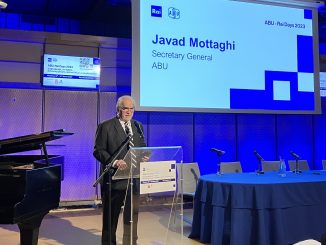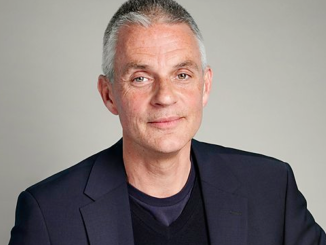As this year’s ABU-Rai Days conference began in Florence Italy, Rai President Marinella Soldi welcomed delegates from Europe, Asia and Africa saying:“ABU Rai Days fosters dialogue between different cultures and regions. Even though we may seem different one thing unites us all, the topic of this conference – sustainability. The sustainability of our media organisations and the sustainability of the planet.“At RAI we are trying to build our sustainability strategy around environmental, social and governance,” she said.
ABU Secretary General Javad Mottaghi, in his last conference before retirement, thanked RAI for organising the east west dialog, “where we can take advantage of the opportunities to talk together to find solution to the common challenges that broadcasters are facing today.”“There is a growing economic and digital divide… There are natural and man made disasters facing us. Public service media must serve the public and help societies solve these challenges…“In this magnificent city humanity changed, the renaissance was born here and humanity found a new way of understanding medicine, science and arts. The renaissance also questioned dogma and brought the rebirth of new ideas. Media plays that role today, this is part of what we are doing here at this conference.” The Mayor of the City of Florence, Dario Nardella told delegates how proud he was that his city was chosen for this conference:“It is important for our broadcasters to concern themselves with climate because this is about our future. Raising awareness in every citizen is crucial… Cities produce 80% of CO2, they are part of the problem but can also be part of the solution if they commit to achieve carbon neutrality… Everyone must do their part, we can all make a difference,” he said.Florence is part of a movement called Eurocities where cities are all working together to develop projects aiming for climate neutrality through a range of projects and experiments in cities across Italy. He asked the broadcasters to work together with public organisations such as Eurocities “to create a more sustainable world.”After the opening session, a Superpanel hosted by Marinelli Soldi canvassed the topic: A Sustainable Next Generation Ecosystem“At Rai we divided the world into on screen and off screen. Off screen is governance and how we manage the business. On Screen is what we produce. We then approach our work through these lenses it helps us be clear about what we do.. we look through these lenses for sustainability too,” said Soldi.Javad Mottaghi urged public service media to continue winning the trust of the public, “because without trust we will not exist in the face of the many challenges facing us in this changed world. He outlined some of the challenges faced by public service broadcasters. “The first challenge we face is that we may lose audiences to commercial stake holders, other broadcasters plus the internet. The second challenge is understanding the audience and what they want in the new environment. The other challenges are financial, technological and the way we interact with governments.”EBU Director General, Noel Curran spoke about the EBU’s specific role and responsibilities. “We have news and current affairs responsibilities, but sometimes we report too much and explain too little. Explaining requires an investment in expertise, plus creativity and education, not just covering the day to day and week to week news events…“Public service media is known as the most trusted medium when reporting issues of climate change. Not everyone is interested in this topic according to an EBU survey which showed 25% of people saying they have no interest in climate change and many others having no engagement on this topic.“It is our job to engage audiences by using our creativity and programming to explain to them what the issues are.” He gave the example of the tv series The Blue Planet where 80% of viewers say the program inspired them to change their behaviour. “If we seek to educate and are creative and include these issues in our drama and other areas of programming, then we can overcome the challenges of people not being interested or just thinking that it is someone else’s problem,” he said. […]






